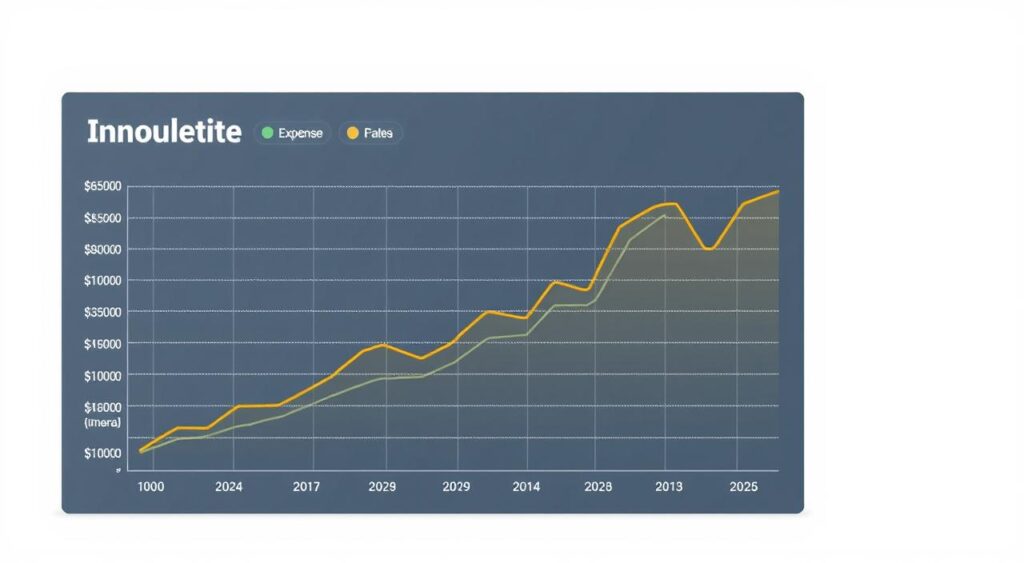Ever wondered why some families seem to thrive financially while others struggle, even with similar incomes? The secret often lies in the art of family budgeting. It’s not just about crunching numbers; it’s a lifestyle choice. This guide offers smart finance tips to help you manage your income and expenses effectively. It ensures your household can live within its means while saving for future goals.
Mastery of budget planning is key to achieving long-term financial health. It allows you to make informed decisions about expenditures.
Key Takeaways
- Family budgeting is essential for financial stability.
- Setting clear financial goals enhances your budgeting process.
- Creating an effective family budget plan helps track income and expenses.
- Effective household expenses management can prevent financial strain.
- Engaging every family member in budgeting fosters mutual accountability.
- Continuous learning about personal finance management empowers better decision-making.
- Adjust your budget to adapt to unexpected financial changes.
Understanding the Importance of Family Budgeting
Family budgeting is vital for the financial well-being of your home. It helps you allocate funds, save for emergencies, and plan for the future. By tracking your spending and cutting costs, you avoid financial shocks. This approach also guides you towards long-term financial goals.
Regularly reviewing your expenses leads to better decision-making. It prepares you to handle unexpected financial issues. When everyone in the family is involved, you create a united front in managing finances. A solid budget helps your family develop good spending habits, ensuring financial stability and success in achieving common goals.
| Benefits of Family Budgeting | Description |
|---|---|
| Prioritization of Spending | Helps families focus on essential expenses, avoiding unnecessary purchases. |
| Emergency Savings | Encourages setting aside funds for unexpected situations, providing peace of mind. |
| Financial Goal Achievement | Clearly outlines steps to reach long-term goals, such as buying a home or funding education. |
| Informed Decision-Making | Regular reviews enable families to make educated choices about spending and saving. |
| Collaboration | Involves all family members, promoting open discussions about finances. |
Setting Financial Goals for Your Family
Setting clear financial goals is the foundation of effective family budgeting. Start by categorizing goals into short-term and long-term objectives. Short-term goals might include saving for vacations, while long-term goals could be buying a home or funding college. Each goal should meet the SMART criteria: specific, measurable, achievable, relevant, and time-bound.
Engaging your family in goal-setting makes everyone accountable. It turns financial ambitions into shared responsibilities. This collective effort strengthens your family’s financial management.
Having specific financial targets makes personal finance management more focused. For instance, saving for a family vacation requires setting a total cost, deadline, and monthly savings amount. Making goals tangible helps turn abstract ideas into concrete steps, driving progress.

- Identify short-term and long-term goals
- Follow the SMART criteria for effective goal-setting
- Involve the whole family to boost commitment
- Track progress regularly to build motivation
Clear objectives empower you to manage family budgeting more effectively. This structured approach improves your financial literacy and ensures everyone is on the same page. Setting financial goals serves as a guiding light, leading your family towards a more secure financial future.
Creating a Family Budget Plan
Creating a detailed family budget is key to managing finances effectively. Start by listing all your income sources and categorizing monthly expenses. This method improves your household expenses management and gives you a clear view of your financial status.
Begin by tracking your monthly income and expenses. It’s helpful to divide these into fixed costs, like rent or mortgage, and variable costs, such as groceries and entertainment. This helps you understand your spending better.
The 50/30/20 rule is a common budgeting strategy. It advises using 50% of your income for needs, 30% for wants, and 20% for savings or debt. This rule makes budgeting simpler, helping you control spending without cutting into essential expenses.
Regularly reviewing and adjusting your budget is essential. Life changes, such as a new job or unexpected bills, can alter your income and expenses. Adapting your budget to these changes is vital. This proactive step enhances your household expenses management and strengthens your family’s financial stability.
Household Expenses Management Strategies
Effectively managing household expenses is key to financial stability. Strategic planning and discipline are essential. Shopping with a list can prevent impulse buys, keeping you on budget. Meal planning reduces food waste, saving money over time.
Budgeting tools help analyze monthly expenses. They reveal unnecessary subscriptions or services to cut. Setting aside for unexpected costs also helps. It prevents financial stress during emergencies.
Here are some tips for better managing household expenses:
- Implement a no-spend day each week to encourage mindful spending.
- Use budgeting tools to track your expenses and identify areas for improvement.
- Regularly review your spending categories to adjust based on necessity.
- Engage family members in discussions about money management to promote a culture of budgeting.
- Explore community resources for further financial education opportunities.

Being aware of your spending habits empowers informed decisions. Adopting these strategies improves your family’s financial health.
Tracking Your Budget Effectively
Effective budget tracking is key to managing personal finances. Keeping tabs on your family’s income and expenses helps stay within budget. By monitoring your finances, you can spot spending habits that need tweaking.
Tools and apps can greatly aid in budget tracking by categorizing expenses. They visually present your spending, making it clear where your money goes. Regular budget reviews, whether weekly or monthly, keep you accountable and disciplined in managing your family’s finances.
- Choose budgeting tools that align with your needs.
- Set specific times for regular check-ins.
- Adjust your budget as necessary to meet financial goals.
“Budgeting isn’t just about numbers; it’s about creating a lifestyle that prioritizes financial health.”
Developing a habit of reviewing your budget fosters accountability in your family. Involving all family members in this process fosters a collective understanding of managing personal finances. This teamwork ensures everyone contributes to maintaining the family budget effectively.

| Tracking Method | Description | Benefits |
|---|---|---|
| Spreadsheets | Customizable tool for recording income and expenses. | Flexibility, detailed insights. |
| Mobile Apps | Apps designed for real-time tracking of finances. | Convenience, quick updates. |
| Envelope System | A cash-based system with envelopes for each spending category. | Clear limits, visual prompts. |
| Iceberg Method | A method focusing on long-term spending changes. | Sustainable savings, gradual changes. |
Adopting effective budget tracking methods into your family’s routine clarifies your financial situation. This clarity empowers you to make informed decisions, enabling your family to flourish financially.
Essential Budgeting Tools for Families
Effective budgeting tools can greatly improve your family’s financial planning. They help manage household expenses and track spending. There are many tools available, each with unique features to support your needs. Here are some popular ones:
- Mint: A complete app that links to your bank accounts, enabling real-time expense tracking and budgeting.
- You Need a Budget (YNAB): This app focuses on proactive budgeting, ensuring every dollar is assigned a purpose.
- EveryDollar: A simple app for families looking to easily create budgets and track expenses.
For those who prefer a hands-on method, spreadsheets offer a customizable budgeting solution. With tools like Microsoft Excel or Google Sheets, you can craft a budget that suits your family’s needs. These tools help you engage more with your finances, leading to a better understanding of your financial health.

Choosing the right budgeting tools can simplify financial planning for your family. It allows for better savings and resource allocation. Match your family’s financial goals with the tools that best suit your needs.
| Tool | Features | Best For |
|---|---|---|
| Mint | Bank account integration, spending tracking, credit score monitoring | Families wanting real-time insights |
| YNAB | Proactive budgeting, goal setting, educational resources | Those looking to adopt a new budgeting philosophy |
| EveryDollar | Simple design, customizable budgets, expense tracking | Families wanting ease of use |
| Spreadsheets | Full customization, manual tracking, complex calculations | Families who enjoy a hands-on budgeting approach |
Embracing Financial Literacy
Financial literacy is key to effective family budgeting. Understanding concepts like interest rates and investment choices empowers you to make informed financial decisions. By investing time in learning together, you enhance your family’s financial knowledge and develop stronger money management skills.
Participating in community financial education initiatives can greatly improve your family’s financial understanding. This makes budgeting more manageable. Focused financial contributions aimed at specific goals, like education or entrepreneurship, lead to sustainable benefits. This approach lays the groundwork for generational wealth, shifting the view from donations to investments.
Using budgeting sheets can improve your family’s budgeting process. For example, budgeting sheets available for ₦7,500 provide a structured approach to manage finances. When making financial transfers, choose platforms like OAPay. This ensures funds reach beneficiaries more effectively, increasing financial support.

| Support Type | Immediate Benefit | Long-Term Impact |
|---|---|---|
| Reactive Giving | Quick assistance | Financial stress; jeopardized goals |
| Intentional Support | Sustainable help | Generational wealth building |
| Community Education | Shared knowledge | Empowered decision making |
| Budgeting Tools | Structured management | Improved savings and investments |
Embracing financial literacy within your family not only enhances budgeting practices but also fosters communication around money management. This approach leads to informed choices, ultimately strengthening your financial foundation.
Smart Saving Strategies for Every Family
Adopting smart saving strategies is key to boosting your family’s financial health. Start by automating your savings. Set up direct deposits into a savings account or retirement fund. This method ensures consistent savings without the need for manual effort. It’s vital to have an emergency fund, aiming for three to six months’ worth of living expenses.
Look into high-yield savings or investment accounts for better returns than traditional options. These can help achieve your personal finance goals while growing your savings. Saving challenges can be a fun way to bond as a family. They motivate everyone to contribute to a financial safety net.
A detailed family budgeting plan helps allocate funds for savings and other goals. Incorporate these strategies to maximize your income. Here are some effective methods:
- Set specific saving targets: Define clear goals for vacations, education, or emergencies.
- Track your spending: Regularly review expenses to identify areas for savings.
- Use apps or tools: Implement personal finance management apps to monitor progress and stay organized.
- Involve the whole family: Make saving a family affair to foster a common understanding of financial goals.

How to Involve Everyone in Budgeting
Involving every family member in budgeting fosters a sense of ownership and shared responsibility. This approach turns budget planning into a collaborative effort. It makes financial management more effective and enjoyable. Hosting monthly finance meetings is key to discussing spending preferences, savings goals, and budgets. This participation helps everyone grasp their role in money management.
Consider the unique perspectives of each family member. For children, introducing budgeting can be enlightening. Encourage discussions about money’s value and practical budgeting skills. This allows them to set their own financial goals. Such involvement promotes accountability and teaches them vital financial lessons for their future.

Shared responsibility in managing finances strengthens family bonds. When everyone contributes, it builds trust and cooperation. Each family member feels more invested in the household’s financial health. This unity leads to smarter spending, better savings, and a more successful budgeting approach.
Adjusting Your Budget During Financial Changes
Life often brings unexpected financial changes, making it essential to adjust your budget for effective family budgeting. Events like job loss or sudden expenses force you to reassess your financial planning. When income drops, look at discretionary spending to find areas to cut back. This flexibility is key to keeping stability during tough times.
If your income increases, it’s important to wisely use the extra funds. Directing these resources towards savings or debt repayment is a smart move. This ensures you build financial security instead of letting it slip away. Regularly reviewing your family’s budget strengthens your financial planning, preparing you for life’s unpredictability.

- Assess your current income and expenses thoroughly.
- Identify non-essential expenses that you can reduce or eliminate.
- Prioritize savings and debt payments in case of increased income.
- Update your budget regularly to reflect ongoing financial changes.
Implementing a structured adjustment process can greatly improve your financial health and resilience. It equips you and your family to confidently navigate through uncertain times.
| Situation | Action | Impact on Budget |
|---|---|---|
| Income Decrease | Reduce discretionary spending | Lower overall expenses |
| Income Increase | Increase savings or debt payments | Build financial reserves |
| Unexpected Expense | Reallocate funds from other categories | Maintain budget compliance |
| Budget Review | Regularly assess financial position | Ensure goal alignment |
Adapting your budget with careful consideration is vital for maintaining your family’s financial health during changes. Embrace flexibility and proactive adjustments to ensure your family remains secure in all situations.
Common Budgeting Mistakes to Avoid
Many families face challenges in effective family budgeting due to common errors. Approximately 70% of families report not consistently following a budget, highlighting a significant gap in personal finance management. Over 43% of those who do budget admit to overspending in at least one category monthly. These oversights can complicate expense management further.
One critical mistake is neglecting to account for unexpected expenses. Research indicates nearly 75% of individuals overlook these costs in their budgeting. This oversight can lead to financial strain when emergencies occur. Further, many families fail to regularly review their budgets. A staggering 50% do not engage in this essential practice, often leading to decisions based on outdated information.
Small expenses often go unnoticed, yet they are vital to the family budget. About 30% of households admit they do not track their spending at all, which increases the likelihood of financial mismanagement. This statistic highlights the need for thorough personal finance management, remembering even the smallest transactions.
The reliance on credit for emergencies stems from inadequate savings plans. Roughly 60% of Americans lack a savings strategy, which frequently leads to suboptimal financial choices during crises. By avoiding common budgeting mistakes and adopting reliable methods, families can build a stronger financial foundation.
| Budgeting Mistake | Impact |
|---|---|
| Not following a budget consistently | Disorganized spending and financial uncertainty |
| Overspending in categories | Increased debt and diminished savings |
| Failing to account for unexpected expenses | Financial strain during emergencies |
| Neglecting to review budgets | Making outdated financial decisions |
| Ignoring small expenses | Accumulation of untracked costs and overspending |
| Lack of a savings plan | Overreliance on credit and debt accumulation |

Ways to Stay Motivated with Budgeting
Staying motivated in family budgeting can greatly improve your money management. Consider setting small rewards for reaching financial goals. This makes the process enjoyable. Celebrating milestones together strengthens family bonds and highlights the value of budgeting.
Visual aids are key to keeping enthusiasm alive. Use charts or graphs to track your progress. This tangible sense of achievement motivates everyone. Discussing financial successes fosters open communication and boosts commitment to budgeting.
Keeping your end goals in sight is essential. Households with clear purposes tend to be more financially disciplined. Studies show that 72% of people stick to their budgets better when goals are written down. Families that document their goals see a 42% increase in savings. Creating a collaborative environment helps all members actively participate in managing money.

Incorporating Fun into Family Budgeting
Budgeting can become a fun activity within your family, not just a chore. By using fun budgeting strategies, you can make financial talks more engaging. Try budgeting games where everyone pitches in ideas for saving or spending. This approach not only keeps everyone involved but also strengthens family ties.
Another way to manage personal finances is by planning budget-friendly outings. Set a financial goal as a family. Once you hit it, celebrate with an activity everyone will enjoy. This approach boosts morale and highlights the value of budgeting.
Creating a family savings jar can be a great motivator. Let each family member add to it, aiming for a specific goal. When you reach it, treat yourselves to something fun. This turns saving into a fun challenge, encouraging everyone to participate in budgeting.

To add more fun, consider a points system. Give points for tasks like tracking expenses or sticking to the budget. The person with the most points at the end of the month gets a special reward. This could be choosing the next family activity or movie night. Such playful elements make budgeting a positive experience for everyone.
| Activity | Points Earned | Outcome |
|---|---|---|
| Tracking expenses for the month | 10 | Increased awareness of spending |
| Sticking to the budget | 15 | Achieving financial goals |
| Family savings jar contribution | 5 | Building savings together |
| Planning a budget-friendly outing | 20 | Encourages teamwork and fun |
Evaluating and Adjusting Your Budget Monthly
Regularly reviewing your budget is key to successful family budgeting. It lets you compare your actual spending with your budgeted amounts. This comparison highlights any discrepancies that could impact your financial planning. It also sheds light on your spending habits and where you can cut back.
Creating a routine for these evaluations is vital. Consistency breeds discipline, making it easier to adjust your budget as needed. Here are some steps to follow:
- Gather your financial statements: Collect all your financial records, including credit card bills and bank statements, to understand your expenses fully.
- Compare actual spending to your budget: See which categories are over or under budget. This helps pinpoint areas needing attention.
- Reflect on your financial goals: Ensure your spending matches your family’s long-term financial goals.
- Make adjustments where necessary: If certain expenses are consistently too high, consider shifting funds or revising your budget.

Using tools can streamline your budget evaluations. Budgeting apps or spreadsheets offer clarity and organization. Below is a table showing common budget categories for tracking your spending:
| Category | Budgeted Amount | Actual Amount | Difference |
|---|---|---|---|
| Housing | $1,800 | $1,850 | -$50 |
| Groceries | $600 | $550 | +$50 |
| Transportation | $300 | $250 | +$50 |
| Utilities | $150 | $170 | -$20 |
| Entertainment | $200 | $240 | -$40 |
Through regular evaluations, you enhance your ability to manage your family’s budget. Adjusting your budget in real-time fosters a proactive approach to financial planning. This ensures you stay aligned with your goals. Regular analysis deepens your understanding of your financial situation, guiding you towards better financial decisions.
Financial Planning: Beyond Budgeting
Financial planning is key to securing your family’s future. While family budgeting manages daily expenses, it’s vital to look at long-term strategies. Investing in the stock market or real estate can boost your income, improving your personal finance management.
Retirement plans, like 401(k)s or IRAs, are essential for a comfortable retirement. Educational savings accounts for your children also help, reducing future debt. These steps show that financial planning is more than just budgeting.
Adding life insurance to your plan protects your family from unexpected events. A solid estate plan ensures your assets are distributed as you wish. These steps highlight the importance of thorough financial planning.
By focusing on these strategies, you can achieve financial stability and peace of mind. Preparing for the unexpected and investing in your family’s future ensures a secure and fulfilling life.

Conclusion
Mastering family budgeting is key to achieving financial stability and security at home. It sets a clear financial direction and promotes personal finance management within the family. By setting specific financial goals, you guide your decisions. Regularly tracking your budget allows for necessary adjustments.
Financial literacy is a lifelong journey that prepares you for financial changes. By adopting smart budgeting strategies and staying informed about trends, you can face financial challenges confidently. Remember, financial planning is an ongoing effort that requires family collaboration, shaping your family’s future.
Commitment to family budgeting goes beyond just numbers; it fosters a sense of shared responsibility. By involving everyone in managing finances, you create a financially healthy home. This approach prepares your family for both current and future financial needs. Investing in budgeting now will benefit your family’s financial health for years to come.
FAQ
Why is family budgeting important?
Family budgeting is vital for managing household finances effectively. It involves planning and tracking income and expenses. This ensures your family can live within its means and save for future goals, contributing to financial stability.
How do I set financial goals for my family?
Begin by identifying both short-term and long-term goals. Ensure these goals are specific, measurable, achievable, relevant, and time-bound. Involving the whole family in goal-setting fosters accountability and strengthens commitment.
What should be included in a family budget plan?
A detailed family budget plan should outline expected income and categorize necessary expenses. It should include both fixed and variable costs. This helps organize financial priorities and aids in effective budget tracking.
How can I effectively reduce household expenses?
To manage household expenses, implement cost-cutting strategies like meal planning and shopping with a list. Comparing prices is also beneficial. Regularly reviewing expenses helps identify unnecessary costs to eliminate.
What are some effective budgeting tools for families?
Popular budgeting tools include apps like Mint, You Need a Budget (YNAB), and EveryDollar. These tools track spending, automate savings, and generate financial reports, making budgeting smoother.
How can financial literacy impact family budgeting?
Financial literacy empowers families to make informed spending and saving decisions. Engaging in educational resources enhances money management skills within the family.
What savings strategies should families consider?
Families should automate savings, create an emergency fund, and explore high-yield savings or investment accounts. Encourage participation in saving challenges to foster a collaborative approach to building financial stability.
How do I involve my family in the budgeting process?
Host monthly finance meetings for all family members to discuss spending preferences and savings goals. Engaging children in budgeting discussions enhances their understanding of money and fosters shared responsibility.
What should I do if my financial situation changes?
Stay adaptable and analyze your budget for necessary adjustments when financial changes occur. Cut back on discretionary spending if income decreases, or prioritize savings if income increases to ensure effective financial management.
What common budgeting mistakes should I avoid?
Avoid underestimating expenses, neglecting to review your budget regularly, and setting unrealistic goals. Impulsive financial decisions can lead to budget overruns, impacting overall personal finance management.
How can I stay motivated while budgeting?
Set up small rewards for achieving financial milestones, celebrate achievements as a family, and visually track progress with charts. Keeping discussions about financial successes alive reinforces your commitment to budgeting.
How can I make budgeting fun for my family?
Incorporate fun budgeting strategies by creating games, organizing budget-friendly outings, or establishing a family savings jar that leads to a fun activity once a certain amount is saved. This builds engagement with financial discussions.
Why is it important to evaluate and adjust my budget monthly?
Regular monthly evaluations allow you to compare actual versus budgeted figures, helping you identify discrepancies and make timely adjustments. This practice reinforces good financial planning discipline and ensures you remain on track.
What does financial planning encompass beyond budgeting?
Financial planning includes long-term strategies such as investments, retirement plans, educational savings accounts, and estate planning. It prepares your family for unforeseen events and ensures a secure financial future.
